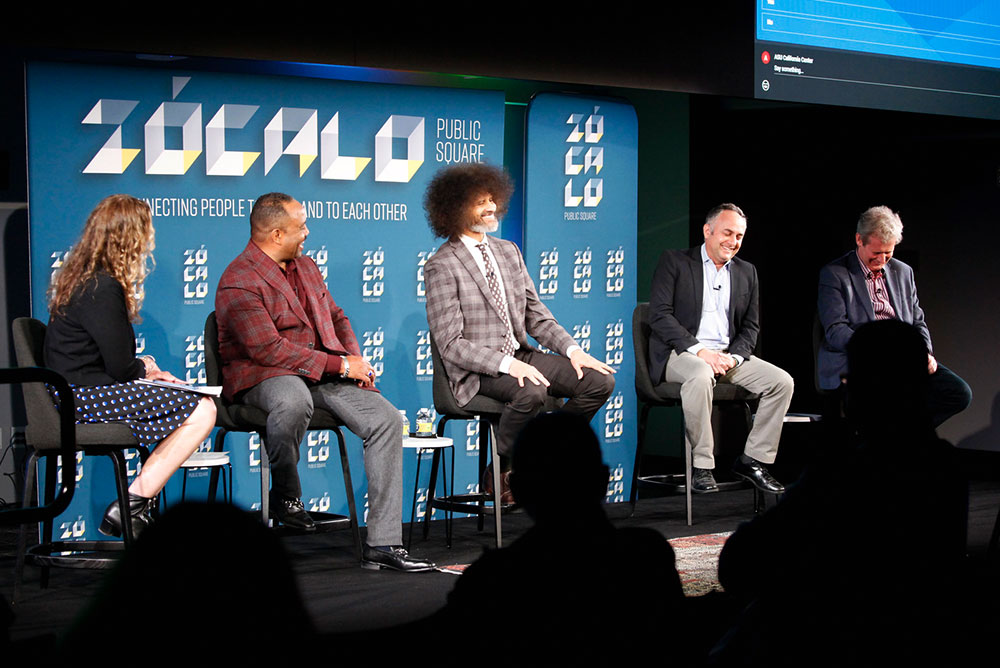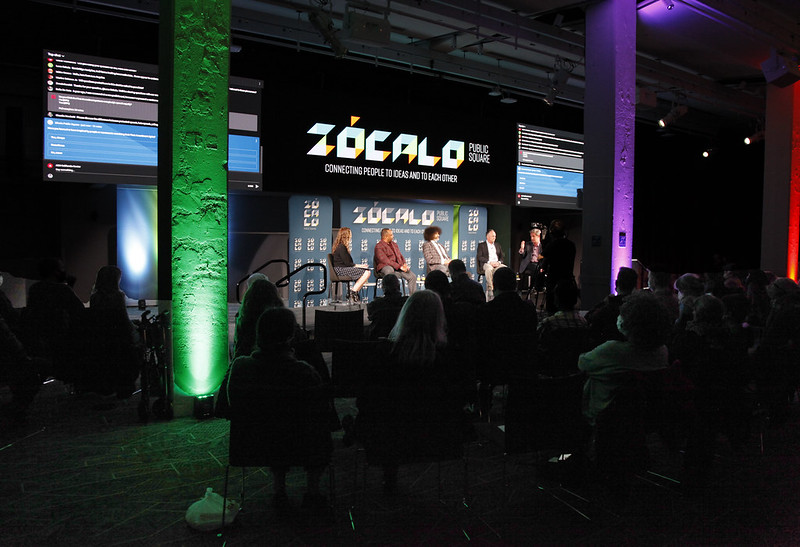
From left to right: Carla Hall, Battinto L. Batts Jr., Jody David Armour, Jean-Paul Jassy, and Eugene Volokh.
The First Amendment protects you. The First Amendment also protects your enemies. While the volume of today’s battles may be louder, the right to free speech remains a foundational aspect of American democracy. That was the conclusion of a panel of experts assembled at the ASU California Center in downtown L.A. for the Zócalo/ASU Cronkite School event “Does the First Amendment Still Protect Free Speech?”
Los Angeles Times editorial writer Carla Hall, who moderated the discussion, kicked it off with the words of University of Michigan legal scholar Catharine A. MacKinnon, who argues in The Free Speech Century that the First Amendment has increasingly moved from “a defense of the powerless” to “a weapon of the powerful.”
“What do you make of that?” Hall asked the panelists.
“The First Amendment protects the freedom of speech,” said UCLA School of Law professor Eugene Volokh. “It doesn’t protect the freedom of speech for the powerless. It doesn’t protect the freedom of speech for this group or that group. It protects the freedom of speech. We shouldn’t be surprised that anybody who speaks would make claims under the freedom of speech, and that the Supreme Court would protect those claims in many situations and reject them in some situations.”
But what, asked Hall, about Citizens United v. FEC, the court’s 2010 ruling that limiting political spending by corporations and individuals was a First Amendment violation?
The First Amendment cannot protect everybody except corporations and unions, Volokh said. Nodding to Hall’s employer, the Los Angeles Times, he added, “If you’re trying to suppress the speech of corporations, you’ll be suppressing the speech of newspapers and religious groups and others as well.”
Attorney Jean-Paul Jassy, who has litigated First Amendment cases in the United States Supreme Court and the California Supreme Court, agreed that the history around free speech can be as unsavory as it is triumphant. But as someone who regularly represents media companies, reporters, and nonprofits, he takes a position that freedom of speech is for everybody, even the company that owns the National Inquirer. In a case claiming the Inquirer used a “catch-and-kill” strategy to bury a story, Jassy defended the company. Citing Miami Herald Publishing Company v. Tornillo, Jassy made the argument companies can decide what they publish or do not publish. “This happens all the time, and if we start getting into that system where we examine what a newspaper or TV station publishes or puts on the air, it’s very dangerous,” said Jassy.
Turning to USC legal scholar Jody David Armour, Hall asked for his thoughts on the role of protest in free speech, citing a recent Los Angeles mayoral debate at Loyola Marymount University that activists disrupted.
They have the right to protest, said Armour, and just like in a private venue, security has the right to remove them. “Civil disobedience comes with a price tag,” he said. It’s a risk he’s taken himself, and one that can lead to change, he noted.
Battinto L. Batts Jr., dean of the ASU Cronkite School, agreed: “This thing we call democracy that we pine for is not a pretty process. It’s not a fine dining event; it’s a food fight sometimes.”
“Who are we to judge about whether that was a successful event or not because it wasn’t orderly in the fashion that we thought it would be going in?” Batts continued. “The protestors would say it was a successful event on their behalf because their perspectives were voiced. We can’t say, well, this group gets to speak, and when they get to speak, and how they get to speak, and they get to do it uncontested. That’s not freedom of speech. That’s control.”
To shut down protest speech would mean shutting down movements, said Armour. “I know there wouldn’t be a Black Lives [Matter] movement without robust freedom of speech.” After the killings of Mike Brown and Trayvon Martin, he saw Black Twitter and other Black social media take off. What if they had been shut down? “You had the movement of our generation. The generational upheaval a couple years ago was made possible by robust protection of First Amendment rights,” he said.
Before the night closed, the panelists also spoke about hot-button issues in the news today, from Sarah Palin’s libel lawsuit against The New York Times, which they don’t think the Supreme Court will hear, to Florida’s “Don’t Say Gay” bill that aims to prohibit “classroom discussion about sexual orientation or gender identity” in the state’s primary schools.
“If we’re talking about public schools, those are parts of the government,” said Volokh. Because they are agencies of the state, “it’s not a First Amendment violation because it’s all about state telling state employees what they can say as part of their state jobs.” However, were the state to tell that to private schools, that would be a clear First Amendment violation.
And, if you were wondering about what the famous free speech analogy about “yelling fire in a crowded theater” is all about, the panelists answered that as well before they wrapped. “Somebody told me that First Amendment lawyers and professor who teach it hate that phrase,” said Hall, who brought the question up.
Yes, said Jassy, in part because omitting the word “falsely” changes the meaning of the entire thing. But, there’s another subtlety to the saying, which originated in 1919 as well, he said: “It’s kind of an outdated catch phrase.” The underlying case that justice Oliver Wendell Holmes was writing it for, U.S. v. Schenck, was overturned in favor of a more modern test for immediate harm in the 1969 case Brandenberg v. Ohio. There the Supreme Court determined inflammatory speech is protected under the First Amendment unless that speech “is directed to inciting or producing imminent lawless action and is likely to incite or produce such action.”





Send A Letter To the Editors